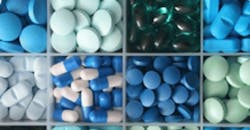US Names Drugmakers ‘Gaming’ Safety to Shield Profits
The administration released a list of pharmaceutical companies including Gilead Sciences Inc. and Celgene Corp. that rivals say are blocking attempts to create cheaper generic versions of their products.
The move by the Food and Drug Administration is a major step by Commissioner Scott Gottlieb to end what he has called “gaming” of the system by branded drugmakers. The list, posted on the FDA website on May 17, will be updated as generic manufacturers make the agency aware of further problems obtaining samples, he said.
“We hope that this increased transparency will help reduce unnecessary hurdles to generic drug development and approval,” Gottlieb said.
As part of the process of developing and getting clearance for a generic pill, which can cost a fraction of a brand-name version, manufacturers typically obtain samples of original drugs before they go off patent in order to begin development of replicas.
Generic-drug makers usually need about 1,500 to 5,000 samples, Gottlieb said. Makers of the copycat drugs say that in some cases they’ve been unable to get samples of the drugs due to safety programs that were designed to protect patients, but that have been used instead to prevent competition.
“They’re using laws to promote public health and innovation to pad their pockets instead,” Health and Human Services Secretary Alex Azar said in a speech on May 16.
Celgene Cited
Celgene, maker of one of the world’s biggest brand-name cancer treatments, Revlimid, has been frequently accused of using safety programs to forestall cheaper versions of its drugs. Revlimid, which costs more than $100,000 a year, had sales of $8.19 billion in 2017.
According to the database, generic drugmakers contacted the FDA 31 times to say they were unable to obtain samples of a Celgene drug. The complaints were divided among three drugs, with 13 instances pertaining to Revlimid, which is also the subject of a legal battle over its intellectual property.
In addition to Celgene, Swiss drugmaker Actelion, which was bought by Johnson & Johnson last year, had 26 inquiries on four drugs. Novartis AG had 11 inquiries on four drugs and Gilead had 11, 10 of which were about its high-blood-pressure treatment Letairis.
The Pharmaceutical Research and Manufacturers of America, the lobbying group for brand-name drugmakers, raised concerns that FDA’s list “lacks proper context” and should include pharmaceutical firms’ responses.
PhRMA also pointed out that the FDA approved a record number of generic drugs last year.
“Efforts to enhance competition in the marketplace for biopharmaceuticals has helped make the United States a global leader in generic prescriptions with more than 90% of all prescriptions filled being generic,” the group said in a statement.
Pharmaceutical companies can block access to their brand-name products through tight safety restrictions on how the drugs are distributed. The FDA can require those restrictions as part of what’s called a risk evaluation and mitigation strategy, or REMS. That program is used when the agency wants a drugmaker to keep a closer eye on a drug once it’s on the market. Companies can impose the distribution limits on their own, and are sometimes accused of doing so solely to block generic competition.
“I’m not looking to shame drug companies,” Gottlieb said at a breakfast with reporters on May 15. “I’m looking to bring transparency around what I think are reasonable public health questions.”
Safety Factors
Many of the about 50 drugs on the FDA’s list published on May 17 aren’t subject to a REMS. For those that are, the FDA will review the protocol the generic company proposes to use to protect the tight distribution and write a “safety determination letter” to ensure the original drugmaker that releasing samples won’t violate the REMS.
Revlimid has a REMS program and the FDA has sent Celgene four safety determination letters.
Some 74 drugs with 2016 sales totaling roughly $22.7 billion were subject to a restricted access program, according to a report by Matrix Global Advisers, which was sponsored by the generic drugmaker lobby, the Association for Accessible Medicines. Around half were government-mandated REMS programs and the other half are sold through a company’s elective limited-distribution programs.
The trade group has pushed Congress to pass a bill that would prevent pharmaceutical companies from using safety programs to block generic-drug firms’ access to samples. While the bill has bipartisan support, it hasn’t become law. The lobby group PhRMA has argued that it would be a boon for trial lawyers.
By Cynthia Koons and Anna Edney
About the Author
Bloomberg
Licensed content from Bloomberg, copyright 2016.
